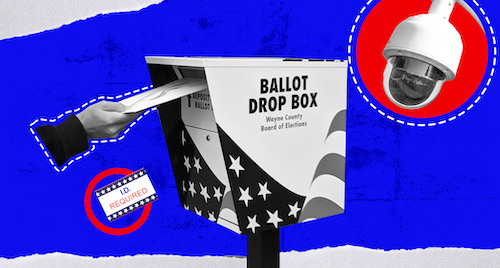
In 2018, Michigan voters approved a constitutional expansion of voting rights that included no-reason absentee voting and same-day voter registration. Both proved consequential in the 2020 election, but now, the pendulum may be swinging the other way. As we’re seeing in states like Arizona and Georgia, Republicans in the Michigan legislature have introduced dozens of bills that would, if passed, add new restrictions on voting. Advocates say they’re necessary to protect the integrity of elections; critics call them voter suppression. So to learn more about what’s going on, we reached out to Dale Thomson and Julio Borquez — two UM-Dearborn political science professors who closely follow election issues. Our conversation with them below has been condensed and lightly edited for clarity.
So as of now, there are about 40 different voting-related bills that have been proposed by Michigan Republicans, covering everything from voter ID provisions to drop boxes. What would you say are some of the most significant proposals?
Dale: I think one of the biggest issues is voter ID, both for in-person voting and absentee voting. Under current law, in-person voters without photo ID simply have to sign an affidavit attesting that they are who they say they are. Their votes can be challenged, but they are not considered provisional, and there is no obligation for the person to provide ID to the clerk subsequent to voting. Under the new proposal, these votes would now be considered provisional and would not be counted unless the voter provides the necessary documentation to the clerk within six days. For absentee voting, the new laws would require voters to show their ID if they’re requesting the absentee ballot in person or provide a photocopy of their ID with the application if the request is by mail.
There are also new restrictions on drop boxes. First, clerks would have to monitor them with high-definition cameras; they already have to monitor them with video cameras. And the drop boxes would be locked at 5 p.m. on the day before election day, so after that deadline, you’d have to hand deliver your absentee ballot directly to the clerk’s office. There are other restrictions on clerks and the Secretary of State regarding sending absentee ballots. Clerks couldn’t send a prepaid postage envelope with the ballot, and the Secretary of State could not send out ballot applications unsolicited, or even send a link to the website that has the application.
Julio: That’s a great rundown. The only thing I would add in terms of context is not all of the provisions are what we’d call “restrictive.” We’ve seen this in other states’ packages, and we’re seeing it here in Michigan, but among this collection of proposals that would largely make it more difficult or inconvenient to vote, there are one or two provisions that look like attempts to expand access. For example, in Michigan, there is a “pre-registration” provision for young people so that when you went to get your driver’s license at the Secretary of State, you’d be automatically registered to vote when you turn 18. Another would require local clerks to open for early voting on the second Saturday before an election. So that gives Republicans a platform to say that they are trying to expand access, at least in a few areas.
So advocates of these bills often argue that they’re just common sense things we can do to protect the integrity of the voting system. But as political scientists who study this stuff, is there any evidence that there are big problems with election integrity?
Julio: No. That’s the short answer.
Dale: Absolutely not. And the Brennan Center is a great place to go if you want to read about this. The actual evidence that voter fraud occurs is infinitesimally small, and there is no evidence that even where it has occurred, it’s at any level that could change the outcome of an election.
So if we don’t have a big problem, what’s your take on why we’re seeing such a big push for these kinds of laws?
Julio: I think the context here has a short-term and longer-term component. The short-term is the 2022 election cycle, and Republicans have an eye on trying to take back control of the Senate and perhaps the House. And Republicans likely won’t benefit from bigger turnouts that you’d see with expanded ballot access. That’s the immediate motivator that could explain this intense push right now for these specific provisions. But beyond that, what’s going on here is that the Republican Party is now essentially a minority party in the United States. There are more Democrats than Republicans in the electorate. Republicans haven’t won the popular vote in the past four presidential elections. Most Americans disagree with the Republican Party on most major policy issues. And the core constituencies of the Republican Party are a shrinking proportion of the population and the electorate. So they’re not at a good starting point in terms of winning general elections. And one way to continue to thrive when you’re in that minority status is to find ways to place barriers to voting for your opponent’s constituencies.
Dale: This is an important point, because it’s not just about how many people are voting but who is voting. The data show these provisions clearly have a disproportionate impact on traditional Democratic constituencies, especially lower-income minority voters. Why is there a focus on absentee voting, for example? It’s because in the 2020 election, absentee voting strongly favored Democratic candidates relative to in-person voting. It’s the same with the voter ID requirements. Today, about 11 percent of people in the country don’t have the required ID, but it’s even higher for African American voters.
Julio: We should also point out that this is not the first time we’ve seen this. After the Obama victories, we saw a similar effort to pass new voting restrictions, particularly voter ID laws. For example, North Carolina is one of a few states where race is registered as part of your voter file. And we saw Republicans in the state legislature very deliberately requesting breakdowns by race of the kinds of government issued ID that people have. So they knew about differences in distribution of driver’s licenses versus other forms of ID, and they very meticulously planned their provisions around this — so much so that the courts struck them down.
Here in Michigan, given that we have a Democratic governor, most of these laws wouldn’t have much of a chance of getting passed. But knowing this, Republican leaders are now saying they plan to use this quirk of the ballot initiative process as a workaround. Can you explain that?
Dale: So to get a ballot initiative in front of voters, you have to first collect the number of signatures equivalent to 8 percent of the people who voted in the governor’s race in the last election. That number is 340,047 signatures. You have 180 days to gather those signatures, and once those are certified, the legislature has 40 days to pass the legislation as it’s written in the initiative. If they do, then it will not appear on the ballot, and the governor can’t veto it. Michigan, in fact, is one of only two states that prevents a veto by the governor. This really runs counter to the spirit of the citizen initiative process in a number of ways. The whole ballot initiative process is sold as a really democratic process because citizens can get legislation passed when the legislature won’t do it. But in this case, citizens aren’t even initiating it and won’t get to vote on it. This is significant to me because people often sign ballot initiative petitions because they feel something deserves to go in front of voters, not necessarily because they support it. I’ve done that myself. So people might not realize that their signature is essentially a vote in favor of these laws, because the whole strategy by the legislature is to approve it before it gets to voters.
Finally, let’s say these things do pass. I’ve heard some folks say the impact might not be that big a deal, because the other side is just going to organize even harder to get out their voters and make sure people have the right ID, etc. Georgia, or example, doesn’t have a reputation as a voter-friendly state, and Democrats were still able to overcome that because they were so well organized in 2020. What do you think of that argument?
Julio: What bothers me about that is that organizing around these burdens shouldn’t be necessary. I mean, is that what we want our elections to become? Organizing around burdens that make it difficult or inconvenient to vote? Voting isn’t supposed to be a Herculean thing to do. At least I don’t think so. So I find the basic premise behind that argument kind of hard to accept. There has to be more to our politics than winning.
Dale: I totally agree. We’ve been talking about this in my American Politics class, and some of my students see this just as playing the game and doing what it takes to win. Yet in this case, they’re not actually playing the game; they’re changing the rules of the game because they’re less likely to win if they played by the existing rules. But regardless, that’s not what politics is supposed to be. It’s not supposed to be a game where victory is the ultimate goal. We’re supposed to have a system of government where people’s voices can be heard and people are driving policy decisions. But that’s not the focus today. The focus is on power, both for the advantages that power gives you but also for the sheer purposes of having power. And that’s very problematic for a democracy. Plus, as Julio alludes to, every dollar or minute spent trying to organize around these burdens is a dollar or minute you can’t spend campaigning for a candidate you’re really passionate about or doing something productive that actually makes your community better.
###
Interview by Lou Blouin. If you’re a member of the media and would like to interview Associate Professors Dale Thomson or Julio Borquez on this topic, please drop us a line at [email protected].





